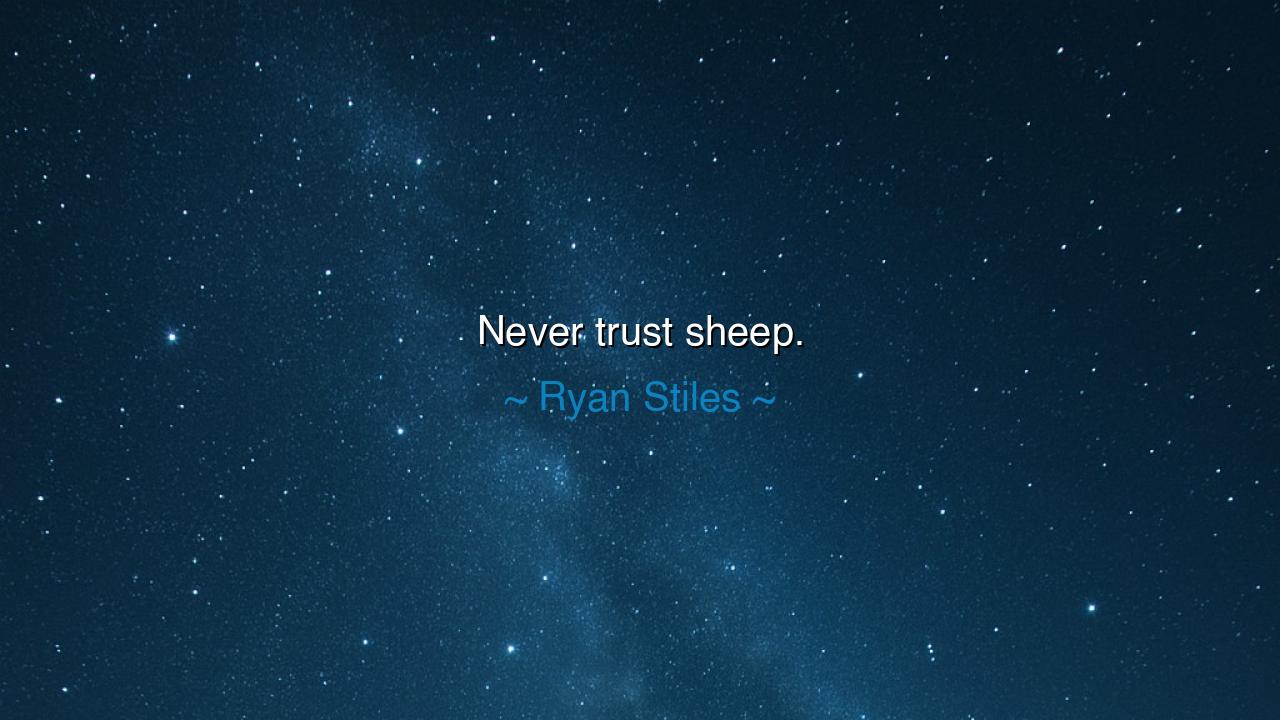
Never trust sheep.






The words of Ryan Stiles—“Never trust sheep.”—though spoken with the humor of a jester, conceal a wisdom as old as mankind’s dealings with flocks and herds. In this short phrase is found a warning, not merely about animals, but about the nature of blind conformity, about those who follow without thought, and about the dangers of placing faith in the unthinking crowd. What begins as a comic observation becomes, when viewed through the eyes of the ancients, a parable about vigilance, discernment, and self-reliance.
For what are sheep but creatures that follow one another without question, straying into danger if not guided by a shepherd? They are harmless in appearance, soft and meek, yet in their very passivity lies peril. They may lead one another into pits, over cliffs, or into the jaws of wolves, and none will resist. To trust sheep is to put confidence in what has no anchor, no wisdom, no strength of its own. Thus Stiles’ words, though spoken lightly, echo a truth: beware the crowd that moves without reason, for its path may be ruin.
The ancients often spoke of this. Plato warned of the fickleness of the mob, easily swayed by rhetoric and passion, rushing after false leaders as sheep rush after the first that moves. The Hebrew prophets, too, described people as sheep without a shepherd—lost, scattered, and vulnerable. Even Christ, in His teachings, distinguished between the true shepherd who guards the flock and the hireling who abandons it, for the sheep themselves could not be relied upon to guard their own way.
History bears grim witness to this truth. In revolutionary France, the crowd that rose against tyranny soon became a mob, swept into violence by its own momentum, unable to restrain itself. Men and women followed one another to the guillotine, like sheep to slaughter, because none dared resist the current of the herd. Contrast this with those rare souls—leaders, thinkers, prophets—who stood apart, guiding rather than following. They were the shepherds, not the sheep, and because of them, the world was not entirely consumed by chaos.
But the danger is not only in nations—it is also in our daily lives. In workplaces, in schools, in communities, people often behave like sheep, following trends, echoing opinions, or surrendering their judgment to others. To trust sheep—to follow the unthinking many—is to risk losing your own path, your own values, your own truth. Wisdom lies not in scorning all others, but in discerning carefully whom you follow, and in refusing to entrust your soul to those who walk blindly.
The lesson for us, then, is this: cultivate the courage to stand apart, to question, to think. Trust not the crowd, but your own conscience. Look not where the herd rushes, but where truth leads. If you must walk with others, choose shepherds of integrity, leaders of vision, companions of wisdom—not those who follow blindly, but those who know why they walk. In this way, you will be protected from the peril of trusting sheep.
Practically, this means resisting the temptation of conformity when it conflicts with your principles. Do not echo an opinion merely because it is popular. Do not choose a path merely because many feet tread it. Test every direction against the compass of truth and duty. And if you find yourself among the sheep, remember: the shepherd’s role may be lonely, but it is the role of strength and leadership. Better to stand apart in wisdom than to run with the herd into destruction.
So let Ryan Stiles’ humorous words echo as an ancient proverb: “Never trust sheep.” For sheep may look harmless, but their blindness will carry you into peril if you trust them too much. Be not deceived by softness, nor lulled by numbers. Stand firm, guide yourself, and when you lead others, lead them not as sheep, but as men and women who see clearly, think deeply, and walk with purpose.






AAdministratorAdministrator
Welcome, honored guests. Please leave a comment, we will respond soon